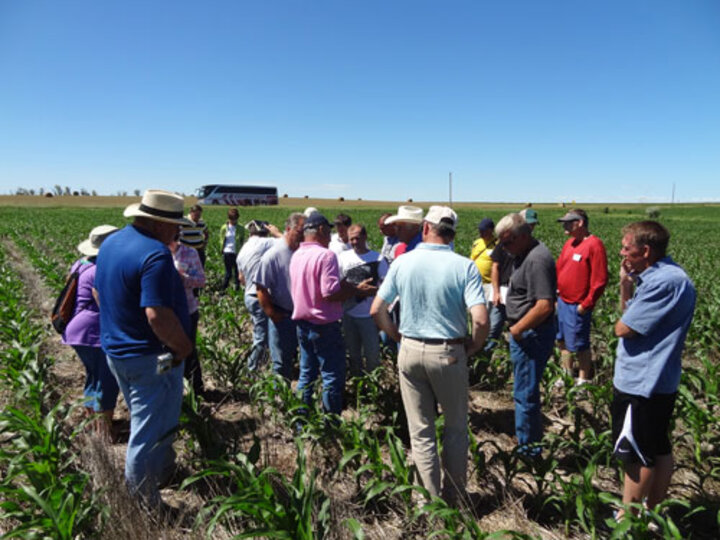Register Now for No-till Bus Tour June 18-19
Nebraska Extension will be conducting a two-day No-till, Cover Crops, and Grazing Bus Tour on Thursday and Friday, June 18-19. The tour will depart from and return to Beatrice and includes visits to producers in southeast Nebraska and northeast Kansas.

Stops will include farms with established no-till, diverse crop rotations, cover crops, and livestock grazing systems. In addition to the educational tour stops where attendees can learn from other farmers, they will be able to network with others who are practicing or interested in learning more about these system.
The tour will leave from the Gage County Fairgrounds in Beatrice at 7:30 a.m. Thursday, June 18, stay overnight in Emporia, and return to Beatrice at 7 p.m. on Friday, June 19. Parking is free on the fairgrounds.Stops
The tour will be visiting four farm operations:
Steve Wiese of Crete plants pivot-irrigated forage crops with no-till corn double cropped for silage which is used for feed at a beef drylot on-site. Wiese no-tills cereal rye after soybean harvest and uses that as a protective soil cover over winter and into spring. After chopping the cereal rye as a forage, he no-tills double crop corn in late May or early June to be cut for silage. Adding rye to his corn/soybean rotation allowed him to keep the regular cash crops, cut fertilizer expenses, and added soil health benefits, providing new efficiencies and diversity for his operation.Josh Lloyd of Oakhill, Kan. has been using no-till on his rain-fed farm for over 15 years. Lloyd uses cash crops and cover crops to keep the soil covered year around. He has one field that has never been tilled as he converted a native pasture to no-till cropland several years ago. His crop rotation is wheat-wheat-double crop or cover crop-corn or milo-soybean-soybean, depending on the field and the resource needs. His double crop has been sunflowers, soybeans, milo, or corn, depending on the year and the moisture outlook. A cow-calf operation was integrated into the operation two years ago as a way to provide short-term income from cover crops.
Gail Fuller of Emporia, Kan. has been experimenting with no-till since the mid-1980s and has been using it 100% since 1995. The further he gets into his journey, the more soil health has become his main focus, leading him to use cover crops and annual forages to improve soil health. He also believes crop diversity, both above and below ground, is the key to building soil health. He grows about a dozen cash crops and uses over 50 plant species as cover or companion crops, planting almost 11 months a year rather than two months of planting in a conventional rotation. He is bringing livestock into the operation using cattle to graze his covers and forages using intensive, rotational, and mob grazing methods. He also has swine, sheep, and chickens and is adding more annual forages as his livestock operation expands.
Keith and Ben Thompson of Osage City, Kan. are father and son no-tillers who are always looking for ways to add more diversity to their operation. They raise corn, milo, soybeans, wheat, sunflowers, annual forages, and cover crops in various rotations to help build the soil and maximize the size of their cattle herd. They use portable electric fencing to mob graze the cover crops and annual forages for short periods. Their goal is to have something growing in their soil at all times, whether it's crops to sell, forages for cattle, or cover crops to feed the soil system.
The tour is partially funded by grants from the Nebraska Environmental Trust Fund project for No-till and Soil Health Education and the Nebraska Extension No-till Educational Program.
Registration
The registration cost is $50 for Nebraska residents/producers and $200 for attendees from outside of Nebraska. THe fee includes motorcoach travel, lodging, and all meals. Registrations are limited to the first 50 people and are due by Wednesday, June 10. Please mail this registration form and your check (payable to the "University of Nebraska—Lincoln") to the address provided on the form. No e-mail or phone registrations will be accepted. No refunds will be given for cancellations after June 10.
There is an extra charge of $50 for those requesting a single room. If you have a roommate preference, please indicate that on your registration form.
